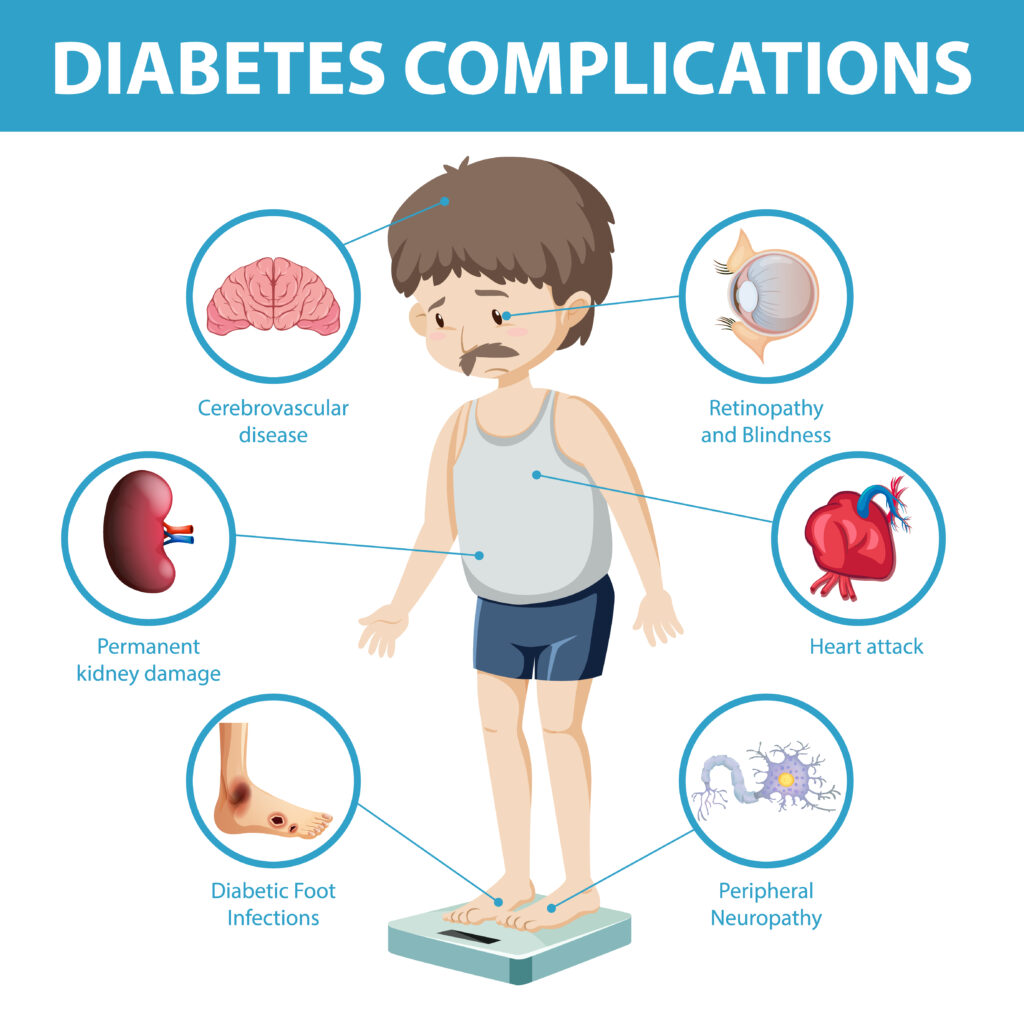Diabetic retinopathy is a serious eye condition that affects people with diabetes. It occurs when high blood sugar levels damage the small blood vessels in the retina, the light-sensitive layer of tissue at the back of the eye. This can lead to vision loss and blindness if left untreated.
Diabetic retinopathy can develop gradually over time, without any noticeable symptoms at first. However, as the condition progresses, it can cause various problems such as:

- Blurred or distorted vision
- Floaters or dark spots in the vision
- Difficulty seeing colours or contrasts
- Poor night vision
- Flashes of light or sudden vision loss
There are four stages of diabetic retinopathy, ranging from mild to severe:
- Background retinopathy: This is the earliest stage, where the blood vessels in the retina become swollen and leaky, but do not affect the vision yet.
- Non-proliferative retinopathy: This is a more advanced stage, where the blood vessels become more damaged and blocked, reducing the blood flow to the retina. This can cause macular oedema, which is swelling of the central part of the retina that is responsible for sharp vision.
- Proliferative retinopathy: This is the most severe stage, where new abnormal blood vessels grow on the surface of the retina. These vessels are fragile and prone to bleeding, which can cause scar tissue and retinal detachment, leading to permanent vision loss.
- Diabetic macular ischemia: This is a rare but serious complication, where the blood flow to the macula is severely reduced, causing irreversible damage to the central vision.
The main risk factors for developing diabetic retinopathy are:
- Having diabetes for a long time
- Having poor control of blood sugar levels
- Having high blood pressure or cholesterol
- Being pregnant or having kidney disease
- Smoking or using tobacco products
- Being of Asian or African descent
The best way to prevent or delay diabetic retinopathy is to keep diabetes under control by following a healthy diet, exercising regularly, taking medication as prescribed, and monitoring blood sugar levels. It is also important to have regular eye exams and screenings to detect any signs of eye damage early and get treatment if needed.
The treatment options for diabetic retinopathy depend on the stage and severity of the condition. Some of the common/available treatments are:
- Noctura400 Therapy: This is a non-invasive treatment and involves using an eye mask which emits a low level wavelength of light, targeting the retinal cells and reducing hypoxia in the eye. It has been shown to be effective for all stages of diabetic retinopathy and diabetic macular oedema.
- Laser therapy: This involves using a laser beam to seal or shrink the leaking or abnormal blood vessels in the retina. This can help reduce macular oedema and prevent further bleeding or growth of new vessels.
- Anti-VEGF injections: This involves injecting a medication into the eye that blocks a protein called vascular endothelial growth factor (VEGF), which stimulates the growth of new blood vessels. This can help reduce macular oedema and prevent further bleeding or growth of new vessels.
- Steroid injections or implants: This involves injecting or implanting a steroid medication into the eye that reduces inflammation and swelling in the retina. This can help reduce macular oedema and improve vision.
- Vitrectomy: This is a surgical procedure that involves removing some or all of the vitreous gel, which is the clear fluid that fills the eye. This can help clear any blood or scar tissue that may be blocking the vision or pulling on the retina.
Diabetic retinopathy is a serious complication of diabetes that can affect anyone with diabetes. It can cause vision loss and blindness if left untreated. Therefore, it is essential to keep diabetes under control and have regular eye check-ups and screenings to prevent or treat any eye problems as soon as possible.
IQ Optometry is based in West London and is accredited by Polyphotonix to provide the Noctura400 therapy for the treatment of diabetic retinopathy and diabetic macular oedema. If you have any questions regarding this treatment option, feel free to ask us via WhatsApp 02084224466.
References:
1: https://www.nhs.uk/conditions/diabetic-retinopathy/
2: https://www.diabetes.org.uk/guide-to-diabetes/complications/retinopathy
3: https://www.healthdirect.gov.au/diabetic-retinopathy
4: https://www.mayoclinic.org/diseases-conditions/diabetic-retinopathy/symptoms-causes/syc-20371611
5: Image by brgfx on Freepik




